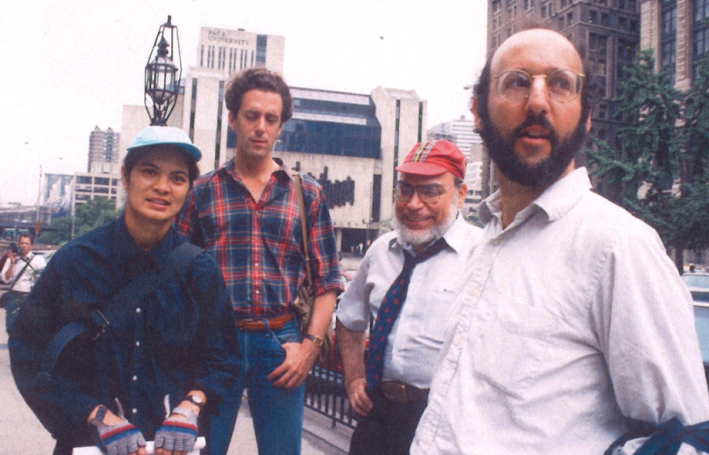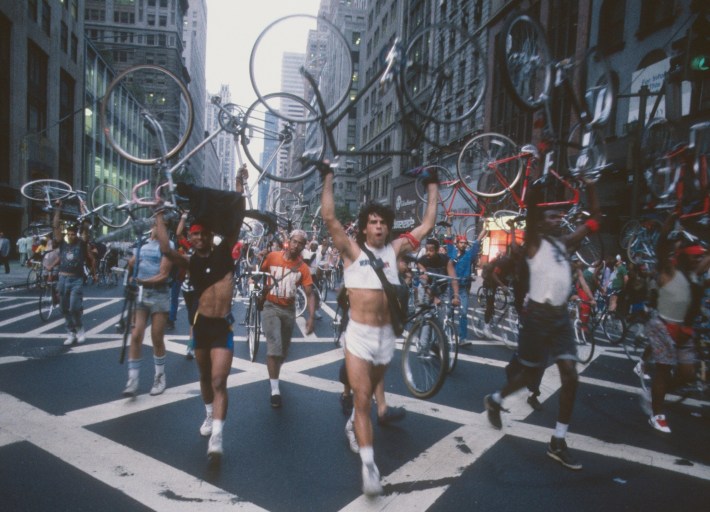For many years, city officials knew that if they attended a public event, they would run into bicycle advocate Roger Herz. Famous for sitting in the front row and asking pointed questions when the microphone was opened to the public, Herz, who died last week at 88, was recognized by municipal officials — but not with the rancor they usually accorded “gadfly” activists.
Herz bought his first bicycle during the transit strike of 1966 and commuted by bike for decades. He was one of the original five co-founders of Transportation Alternatives in 1973 — and he stuck with bicycle activism even as the others moved on. His focus was apparent from the names of the two letterheads he used for most correspondence: “To Improve Municipal Efficiency” (TIME) and “Bicycle Transportation Action.”

"When T.A. became quiescent in the late 1970s and early 1980s, Roger carried the torch of advocacy through and beyond T.A.'s revival later that decade, making sure that bicyclists' demands were heard by city officials who might otherwise have ignored them completely," former T.A. president Charles Komanoff said.
Herz, who held degrees in political science and journalism and had a background in public law and government, had a strong grasp of the cogs of the municipal machinery. His first job was with the City Planning Commission, helping write its capital budget. According to a 1990 profile in the Daily News, Herz "worked 10 years at the Off-Track Betting Corp., eight years at the Department of City Planning, two years at the temporary city finances commission, two years at the constitutional convention commission and a year at the state controller’s office," quitting the state payroll in 1980 — quite a run as a government staffer.
As recounted by New York Law School's CityLand Journal, Herz, a big advocate of public transit, clashed with Robert Moses and his acolytes on the Planning Commission by proposing to shift public funds from roads to transit. One of Moses’s staffer was so exercised during a presentation that he exclaimed: “Why public transit? Everyone owns a car. I don’t know anyone who doesn’t own a car.”
Herz never forgot. In 1969, Herz wrote a letter to the New York Times proposing that the city wrest control of the Moses-established Triboro Bridge and Tunnel Authority from the state, in order to devote its toll revenue to transit, but it was not to be. He later became a fierce advocate of congestion pricing, which will toll cars entering the Central Business District to fund transit.
Herz regularly reminded state and city education officials that the city never established bicycle-safety education in NYC schools — even though the state mandated it. He helped derail an attempt in 1977 by the Law Department to outlaw the locking of bicycles to street posts. (Unfortunately, the Bloomberg administration revived the policy in 2005, to retroactively justify the NYPD's seizure of bicycles from protesters.)
Herz's advocacy sometimes got big results. When Mayor Koch announced a ban on bicycling in midtown in 1987, Transportation Alternatives and others sued and got the ban suspended on a technicality — the Koch administration hadn’t complied with the mandatory public comment periods. While the mayor’s staff began the process of re-issuing the bike ban using the correct procedure, and T.A. prepared for a second court case, Herz worked his prodigious political contacts and got the City Council to pass a unanimous non-binding resolution (32-0, with three abstentions) condemning the ban — likely the knockout blow that convinced Koch to abandon the idea.
How deep was Herz's network? The day before the Koch administration announced its midtown bicycle ban, two city officials called Herz to give him an advance warning. As the ban took effect, Herz and other bicycling advocates met with several deputy mayors, and the transportation and police commissioners.

Herz was a consummate adversary of the status quo, always brimming with ways to make the city better. He passionately fought injustices in areas meaningful to him: bicycle transportation, city planning, women’s equality and reproductive rights. He was a founder of the New York Hall of Science (a science museum located in Flushing Meadows-Corona Park) and a supporter of the Bronx High School of Science Alumni Organization, and was an active member of Mensa. He also advocated for tolls on the three East River bridges, noting that the city had charged tolls from their openings in the first decade of the 20th century until 1911.
"Whether it was the opening of the Sixth Avenue bike lane in the late 1970s, appearing on the steps of City Hall wearing his bike helmet with side mirrors—not simply protesting but offering solutions, or being the first to the mic at some meeting I was chairing, we could always count on Roger to be intense and pose piercing questions and/or offer constructive criticism," "Gridlock Sam" Schwartz, a former city traffic commissioner, reminisced. "Roger was an 'only made in New York City' character."
"They broke the mold after Roger," Schwartz continued. "NYC has lost someone who couldn't have loved the city more. His inimitable approach was best summed up by his tag line, 'Better futile than passive.'"
Herz wasn't always on the front lines; he often worked quietly but effectively in the background. For example, he helped set up a meeting with city officials that led to the first Five Boro Bike Tour in 1977; at a 1981 protest over bicycle access on the Brooklyn Bridge, he and fellow activist Steve Faust scoured the city to find a pro bono lawyer for arrestees. Herz also was instrumental in getting the South Outer Roadway of the Queensborough Bridge opened as a shared path for bicyclists and pedestrians in the 1980s, although that, too, was sabotaged by later administrations. (The city will convert the SOR to a pedestrian-only path and dedicate the North Outer Road, the current shared path, to cyclists by 2024.)
Herz's passing prompted appreciations from longtime observers of municipal affairs.
Bill Cunningham, once a top aide to Mayor Bloomberg, tweeted that Herz was "a real gentleman to deal with, even when disagreeing."
Herz is survived by his sister, Carol Herz Brull, a niece and nephew, and two grandnephews.
– with reporting by Carol Herz Brull and Linda Faust
Ed Ravin (@VeloTraveler), a long-time bicycling and livable-streets advocate, is a past board member of the Five Borough Bicycle Club and Transportation Alternatives.






